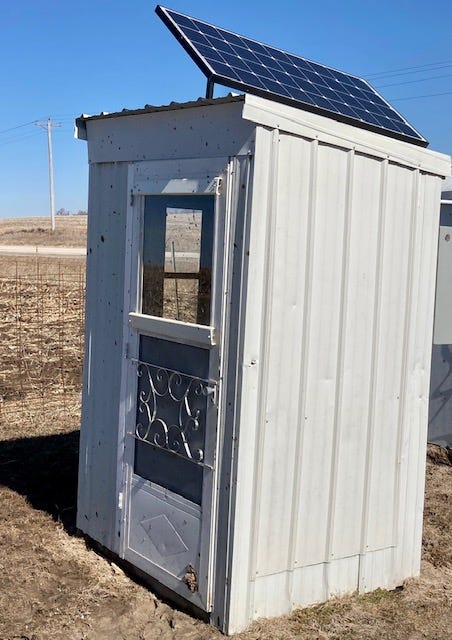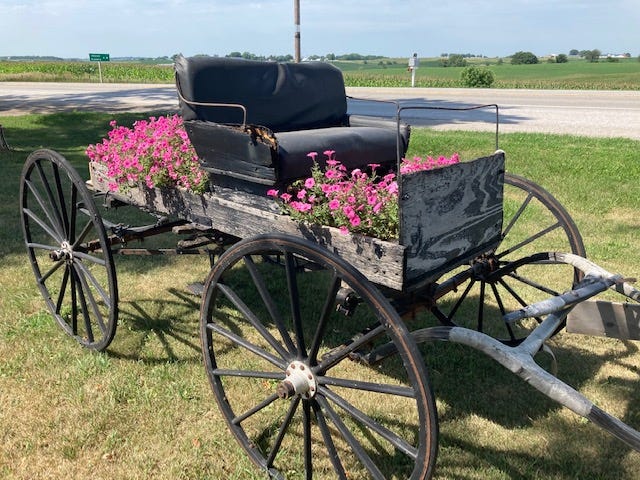“What are you doing this afternoon?” a man’s voice came over the line on the telephone.
I didn’t know if I were being harassed or this was someone friendly. He sounded friendly, but a harasser can sound that way, too.
“Who is this?” I asked.
“I’m wondering if you could run me into the doctor in town.”
The field was narrowing. It had to be one of my Amish neighbors. I hadn’t lived in my place, an old Amish school house, for more than a year. I knew some of my neighbors, but not all of them. And I certainly didn’t know them by the sound of their voices.
“Who is this?” I asked again.
“Moses.”
“Oh, Moses. Sure, I’ll run you into town.”
I was stumped by the way the Amish seemed to lack manners. They were a very polite culture, but they didn’t have the niceties I was used to. They never introduced themselves on the phone. They never said “please” or “thank you.” They might finish a conversation by just walking away.
My Irish mother had drilled manners into me as a child. We said, “Please pass the salt,” when we wanted it at a family dinner, and “Thank you,” when it reached our hands. We said, “It’s nice to meet you,” when introduced to a stranger, and “I hope to see you again,” when we departed. We said, “Hello, come in. Come in,” when that same person came to the door for another visit, and “Let me take your coat,” when they wiggled out of their heavy winter jacket. “Can I fix you a cup of coffee or tea?” when we invited them to sit down in the living room.
I learned that manners showed respect for others, that they were the glue that held together a culture. Manners were underscored by religious beliefs. “Honor thy father and mother. Do unto others as you would have them do unto you. Love thy neighbor.”
Then why did the Amish, a religious society bound together through custom and tradition, skip over manners? At first, my interactions with the Amish seemed curt, abrupt, and a bit disconcerting. Maybe they didn’t have words for please and thank you in their German dialect, and so the sentiment didn’t translate into English. Maybe they weren’t sure about me. A single English woman. Maybe they didn’t want to interact with me. But I hadn’t contacted them. They’d called me from one of their phone shacks in the middle of a cornfield. Maybe they just wanted to do business and not socialize at all.
These interactions remained a mystery. I still took their calls and gradually got better at recognizing their voices. But they continued to speak without identifying themselves and seemed happy to let me guess. Then I did some research about their linguistic patterns and found that the Amish cut out the niceties in their speech for a reason. They thought that manners were an elitist construct. The use of such phrases as “please” and “thank you” would make them sound like the upper class, a class that was on a higher social rung than others, and one that might condescend to others.
Research into my mother’s speech patterns revealed the opposite pattern. The rich landowners and British lords who had colonized Ireland were the mannered ones. Please and thank you connoted upper class wealth and privilege. The peasants, or “shanty Irish” tried to elevate their status by imitating the speech of the elite. Sure, manners conveyed respect, but they also pulled you up in the world, separating you from a long history of poverty and famine.
So, a Facebook posting interested me this week by the Native American writer James Vukelich Kaagegaabaw. He began his post asking, “What kind of culture doesn’t have a word for thank you?” Migwech, the Ojibwe word for thank you was only 400 years old. The Ojibwe people are very grateful, Vukelich Kaagegaabaw explained. Then why wasn’t there a word for thank you?
He theorized that a sense of gratitude is embedded in his language, culture, spirituality and everyday life. The Ojibwe aren’t exchanging anything to get something else. “I’m already looking out for my relatives,” Vukelich Kaagegaabaw said. “I’m not expecting a thank you in return, because when you look at your teachings, this is what you’re supposed to do.”
Another person entered a Facebook comment about the Quakers who have a lot of customs for removing classist assumptions. Like not taking off their hat for someone. Words may have assumptions buried in them of “higher” and “lower” address. They don’t thank someone “higher” for their condescension, for example.
The Indigenous, the Amish, and the Quakers—are all more egalitarian groups than the mainstream hyper competitive society that puts such stock in those words thank you. We drill manners into our children because we don’t expect them to understand the sentiment behind civility as a matter course. We live in hierarchies based on condescension and competition, so politeness can be a surprise.
Now, I’m surprised when the Amish do identify themselves on the phone. And there is no need, really. After thirty years of living in this community, I know most of my neighbors and the sound of their voices. We don’t need to dance around in our conversations. I know they are grateful for a ride to the doctor. I’m grateful I can help. I’m grateful to have them as my neighbors. There’s no need to say migwech.
Listen to the selection from the Buggy Land podcast:
Please read and support my brilliant colleagues in the Iowa Writers Collaborative:







Good. (Notice; no "thank you")
My Hindu Indian daughter also does not say thank you when I prepare dinner, for example, because that’s what mothers do. To say thanks conveys the belief that you do not already respect that role.